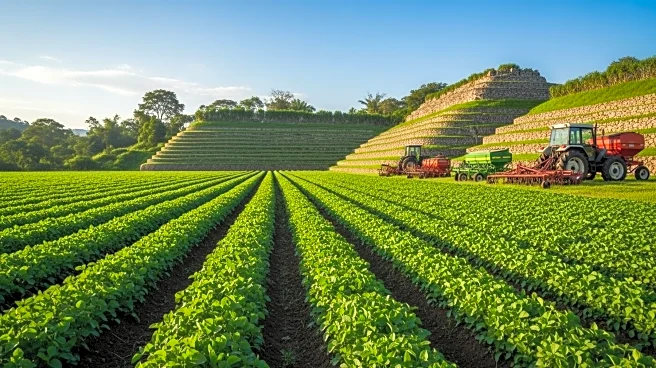What is the story about?
What's Happening?
Researchers are revisiting ancient Mayan agricultural practices to address modern challenges in sustainable farming. The Maya civilization, which thrived in Mesoamerica, developed sophisticated farming techniques that maintained ecological balance and fed millions. These methods, such as the Milpa system, involved intercropping maize, beans, and squash to enhance soil fertility and biodiversity. The Maya also utilized raised fields and terraced farming to adapt to various geographical conditions. As the world faces soil degradation and climate change, these ancient practices are being studied for their potential to improve modern sustainable agriculture.
Why It's Important?
The revival of Mayan farming techniques is significant as it offers a blueprint for sustainable agriculture that can combat soil degradation and biodiversity loss. These methods emphasize ecological balance and soil renewal, contrasting with modern monoculture practices that often lead to environmental harm. By integrating these ancient techniques, modern agriculture can potentially reduce dependency on chemical inputs and enhance resilience against climate change. This approach is particularly beneficial for smallholder farmers and regions facing erratic rainfall, offering a sustainable path forward in global food security.
What's Next?
The integration of Mayan farming techniques into modern agriculture could lead to widespread adoption of sustainable practices. Researchers and NGOs are promoting these methods in regions like Latin America, where they are being adapted for carbon sequestration and biodiversity conservation. The scalability of these techniques depends on community participation and land management, with potential for regional implementation in cooperative models. As scientific validation of these methods continues, they may inspire broader adoption in global agricultural policies.
Beyond the Headlines
Mayan farming represents more than just agricultural techniques; it embodies a cultural philosophy of harmony with nature. This perspective can influence modern regenerative agriculture by emphasizing the spiritual and communal relationship with the environment. As global agriculture seeks sustainable solutions, the Mayan model offers a historical precedent for ecological intensification, where productivity is increased without degrading natural resources.















